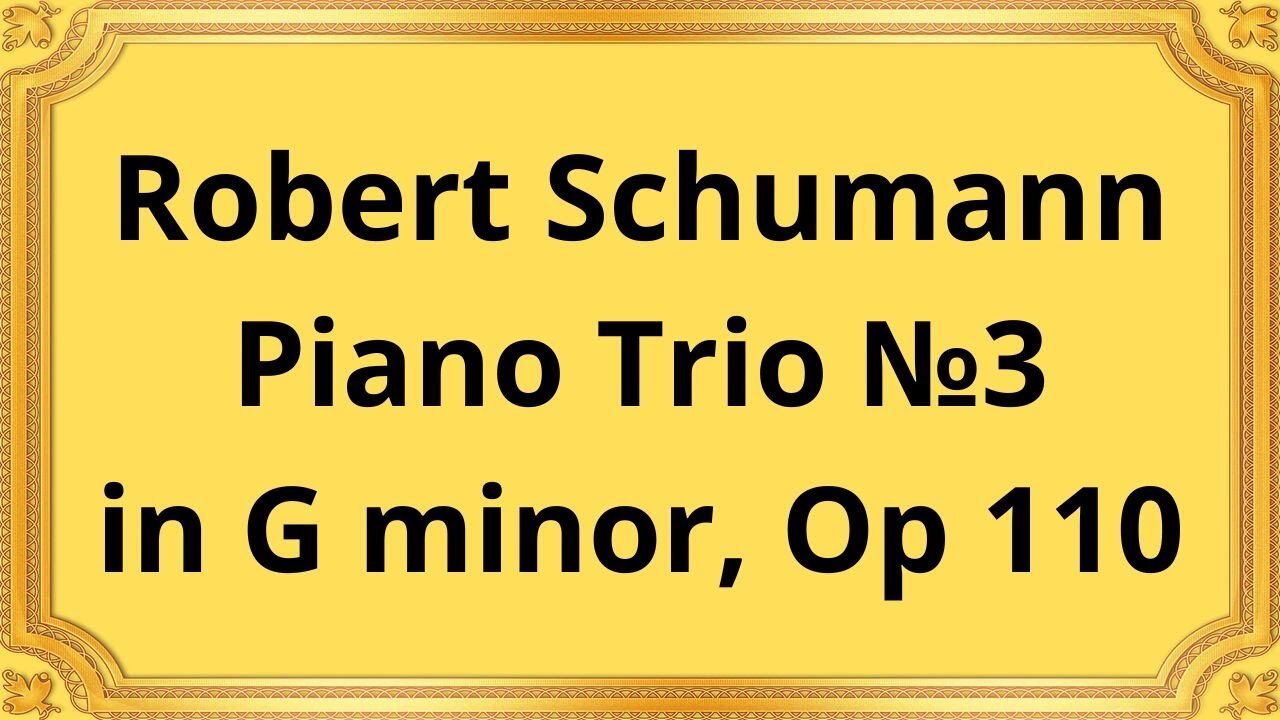Premium Only Content

Robert Schumann Piano Trio №3 in G minor, Op 110
#RobertSchumann #PianoTrioNo3 #GMinor #Opus110 #ClassicalMusic #MusicalComposition #RomanticEra #Piano #GermanComposer #ChamberMusic #PianoTrio #MusicalExpression #EmotionalDepth #19thCentury #MusicHistory #EuropeanClassicalTradition
Beaux Arts Trio
Robert Schumann's Piano Trio No. 3 in G minor, Opus 110, is a captivating musical composition that exemplifies the emotional depth and artistic brilliance of the Romantic era. Composed for piano, violin, and cello, this chamber music masterpiece showcases Schumann's ability to weave intricate melodies, lush harmonies, and profound emotions into a cohesive and captivating musical narrative.
Robert Schumann, a prominent German composer of the 19th century, was known for his contributions to the development of Romantic music. The Piano Trio No. 3 in G minor, Opus 110, composed in 1851, is one of Schumann's late works for piano trio. Schumann's compositions were deeply influenced by his own emotional struggles and his desire to express profound sentiments through music.
The Piano Trio No. 3 in G minor, Opus 110, is structured in four movements, each with its own distinct character, mood, and musical exploration. The first movement, marked "Bewegt, doch nicht zu rasch" (With movement, but not too fast), introduces the listener to a dramatic and passionate musical journey. The second movement, "Ziemlich langsam" (Quite slow), offers a tender and introspective contrast, showcasing Schumann's ability to evoke deep emotions.
The third movement, "Rasch" (Quick), brings a lively and energetic character to the piece, with virtuosic passages and playful exchanges between the instruments. Finally, the fourth movement, "Kraftig, mit Humor" (With strength, with humor), concludes the trio with a triumphant and spirited finale, combining both elements of drama and lightness.
The Piano Trio No. 3 in G minor, Opus 110, holds great significance in the realm of classical music. It stands as a testament to the Romantic era's emphasis on individual expression, emotional depth, and the exploration of the human psyche through music. Schumann's ability to evoke a wide range of emotions, from profound introspection to fiery passion, showcases his exceptional compositional skills.
Moreover, the Piano Trio No. 3 played a vital role in the development of chamber music during the Romantic era. Its intricate interplay between the piano, violin, and cello, and its exploration of a variety of musical ideas and textures, influenced subsequent composers and impacted the genre. The piece stands as a testament to Schumann's musical genius and his contribution to the European classical tradition.
Conclusion:
Robert Schumann's Piano Trio No. 3 in G minor, Opus 110, is a masterpiece that continues to captivate audiences with its emotional depth and expressive qualities. Through its four movements, this composition showcases Schumann's ability to create a rich musical tapestry, blending intricate melodies, lush harmonies, and profound emotions. Its significance in the world of classical music, as well as its influence on subsequent composers, solidifies its place as a cherished gem within the European classical tradition. The Piano Trio No. 3 stands as a testament to Schumann's genius, leaving a lasting legacy that continues to inspire and delight music enthusiasts around the world.
You have the opportunity to support the channel:
https://destream.net/live/RadSiarAl/donate
https://www.buymeacoffee.com/6355radsiaral
-
 20:26
20:26
Classical music_Music Inspiration
1 month agoJohann Sebastian Bach Orchestral Suite No. 2 in B minor, BWV 1066
842 -
 LIVE
LIVE
The Connect: With Johnny Mitchell
7 hours agoOne Man's Mission To Stop Human Trafficking: How A Billionaire Mercenary Saved Hundreds Of Children
61 watching -
 LIVE
LIVE
Tundra Tactical
3 hours ago🔫 California Ammo Win, Sig Sauer P320 Controversy, Meme Review & Would You Rather! 🎉🔥
496 watching -

Forrest Galante
22 minutes ago6 Deadliest Man Eaters to Ever Exist
-
 10:14
10:14
MattMorseTV
5 hours ago $3.71 earnedThe EU is in HOT WATER.
26.5K28 -
 LIVE
LIVE
Mally_Mouse
5 hours agoSpicy Saturday!! - 10k CELEBRATION! - Let's Play: Labyrinthine
419 watching -
 37:09
37:09
The Mel K Show
6 hours agoMel K & Dr. Kirk Moore | A Doctor’s Oath: Doing What is Right No Matter the Cost | 7-26-25
14.4K6 -
 36:44
36:44
NordicVentures
5 days ago $0.71 earnedWINTER Bushcraft 2 Nights: Building ALONE a Survival Shelter
6.52K4 -
 LIVE
LIVE
JakRazGaming
3 hours ago $0.09 earnedPlaying Minecraft with GameQuest1552, Rexmon, and JuicyKinnKandy! Stream 9
81 watching -
 LIVE
LIVE
GoA_Malgus
2 hours agoGoA Malgus - The Legend Has Returned!!! - Live domination on Black Ops 6
46 watching